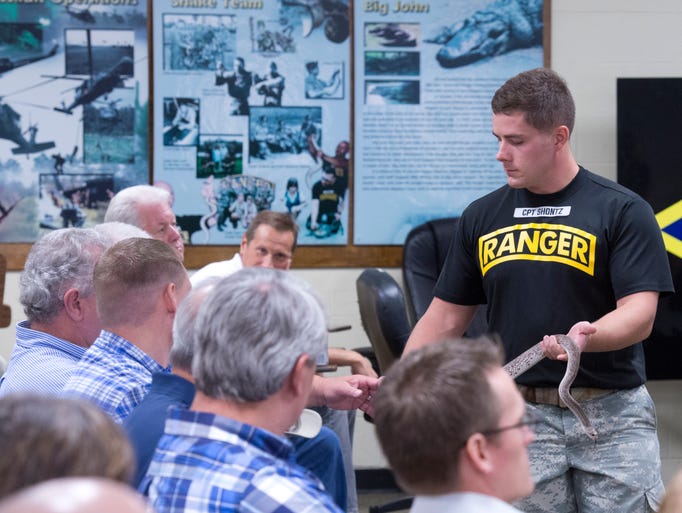Skip to comments.
Lightning Strikes 44 Soldiers and Instructors at Army Ranger School
Military dot com ^
| Aug 13, 2015
| Matthew Cox
Posted on 08/14/2015 11:22:50 AM PDT by LeoWindhorse
Forty students and four Ranger instructors in the swamp phase of Ranger School were struck by lightning Wednesday afternoon.
All 44 were evacuated to a local hospital, but many were discharged, according to a press release from Fort Benning, Georgia, home of the Airborne and Ranger Training Brigade. Eleven soldiers remained hospitalized Thursday evening, according to a news report.
“At the time of the incident, they were conducting lightning-protection protocols when lightning struck nearby,” the release states.
(Excerpt) Read more at military.com ...
TOPICS: News/Current Events; US: Florida; US: Georgia
KEYWORDS: army; camprudder; eglin; florida; fortbenning; georgia; lightning; rangers
Navigation: use the links below to view more comments.
first previous 1-20, 21-40, 41-60, 61-63 next last
To: wrench
Step voltage, voltage drop across resistance, different potentials......That may be the term for lightning.
My training is electrical engineering but I don’t recall having heard that term in what I studied in the electronics realm. But that’s not to say you aren’t correct. My experience is RF, radar and antennas.
41
posted on
08/14/2015 12:10:58 PM PDT
by
Gaffer
To: Gaffer
Agreed - the couch is the safest position. But I always unplug my expensive TV during a big storm!
42
posted on
08/14/2015 12:11:01 PM PDT
by
21twelve
(http://www.freerepublic.com/focus/f-news/2185147/posts It is happening again.)
To: 21twelve
Nice one. Frigging autocorrect...
43
posted on
08/14/2015 12:12:01 PM PDT
by
Gaffer
To: Yosemitest

A day in the life of an Army Ranger
" ... "I woke up in a cold sweat," Col. Robert "Tex" Turner recalled in a slide show presentation. "I had a nightmare that I was still in Ranger School. Thank God that I was in Vietnam. Compared to Ranger School, combat was easy."
Turner, who was known as one of the best in the West Point Ranger Department, was in the Army for more than 31 years, and served two tours of duty in Vietnam.
Still, to him, nothing compared to his time in Ranger School.
Camp James E. Rudder at Eglin Air Force Base is home to the 6th Ranger Training Battalion, where students go through the last of three phases — the Swamp Phase — on the road to becoming Army Rangers.
... After introductions, a safety briefing, and a demonstration that included various venomous and nonvenomous snakes and alligators, the tour group was taken to two main camp areas to observe a live class of Army Ranger students. Those areas included Pine Bluff Lake, where waterborne exercises take place, and the gun range. ... "
44
posted on
08/14/2015 12:12:59 PM PDT
by
Yosemitest
(It's Simple ! Fight, ... or Die !)
To: Gaffer
I read what you wrote and yes I do know why not to lay down v crouch.
45
posted on
08/14/2015 12:14:30 PM PDT
by
smokingfrog
( sleep with one eye open (<o> ---)
To: 21twelve
That reminds me of my childhood, running around unplugging everything ahead of a storm coming up. We’d lay on the bed and watch the fireworks on the mountain with the tv broadcast towers getting struck.
I’ve only had one personal close call with lightning, I was working a summer job in an auto body shop down the road. Sun was still out, storm was not that close or so we thought. A bolt of lightning shot through the eves of the shop, blew out the fans on both ends of the building. It has an odd odor, lightning, or I guess more accurately ozone. My first thought was burnt garlic toast.
To: smokingfrog
Then why did you say “No....... You’re supposed to do what they call the Lightning Crouch?”
My post was “I hope the protocols DIDN’T tell them to lay down flat......”
47
posted on
08/14/2015 12:18:11 PM PDT
by
Gaffer
To: driftdiver
Actually, most of the time it goes from the ground up. We are the 2nd most frequent lightening-struck sate after Floriduh.
48
posted on
08/14/2015 12:23:43 PM PDT
by
x1stcav
(Oh! No! I just learned Freddy Mecury was a queer.)
To: smokingfrog
Thankfully they were discharged after being charged up.....
49
posted on
08/14/2015 12:28:03 PM PDT
by
Squantos
( Be polite, be professional, but have a plan to kill everyone you meet ...)
To: Gaffer
we are in agreement .. I was just trying to clarify what a person should do as opposed to what not to do
50
posted on
08/14/2015 12:31:21 PM PDT
by
smokingfrog
( sleep with one eye open (<o> ---)
To: smokingfrog
Okay...sorry. I mistook your No as a contradiction or something. :0)
51
posted on
08/14/2015 12:32:44 PM PDT
by
Gaffer
To: RegulatorCountry
“That reminds me of my childhood, running around...”
Growing up in the Midwest, there was a young neighbor kid. He would hear the emergency alert thing on TV (I’m guessing) and then run out on his front steps and yell at the top of his lungs “Emergency, Emergency, Emergency!” and then duck back inside.
I recall climbing up on the roof with my older brother to see if we could see a tornado!
52
posted on
08/14/2015 12:34:24 PM PDT
by
21twelve
(http://www.freerepublic.com/focus/f-news/2185147/posts It is happening again.)
To: 21twelve
Good thing you didn’t see one, that was no place to be, lol.
To: 21twelve
54
posted on
08/14/2015 12:36:33 PM PDT
by
smokingfrog
( sleep with one eye open (<o> ---)
To: LeoWindhorse
The EOD training groups does some dive training at saltwater Rocky Bayou near the bridge close to Eglin. When heavy thunderstorms hit the training area while we were watching, they didn’t get out of the water.
Someone asked a Navy NCO EOD instructor who was on shore nearby why they didn’t get out of the water when lightning was striking nearby. He said that they had to get used to all conditions because when they are deployed, they can’t choose the conditions they have to operate in.
55
posted on
08/14/2015 12:40:08 PM PDT
by
Sasparilla
(If you want peace, prepare for war.)
To: Squantos
You are discharged!

... and don't give me any static about it!
56
posted on
08/14/2015 12:42:30 PM PDT
by
smokingfrog
( sleep with one eye open (<o> ---)
To: Gaffer
I never was exposed to the term either. I have many courses and sessions in industrial safety and never had this mentioned to me.
I ran across it while researching something else, and would like more to be aware of this deadly possibility.
As to lightening, lots of discussion about it, but little hard info on it.
When building my house, I wanted lightening protection, and was willing to pay for it. 5 different contractors plus the power company all had opinions on how it should be done, no 2 opinions were the same. And none would offer any kind of damage guarantee what so ever.
57
posted on
08/14/2015 12:47:57 PM PDT
by
wrench
To: LeoWindhorse
Sad. Several soldiers in a direct support unit were hit by lightning near my unit during the early ‘90s. It’s one of the risks of training in the field.
58
posted on
08/14/2015 12:54:05 PM PDT
by
familyop
("I thought you'd be bigger." --barfly talking to a tall, broad-shouldered bouncer long ago.)
To: wrench
yeah....I been through a lot of what you have, too. Especially on how to protect the house.
You can buy a surge protector for incoming power but it will NOT protect your downstream wiring in the home from induced current caused by nearby strikes. There are tremendous electric fields caused by strikes and home wiring can’t be protected by a surge protector on the incoming power feed.
In a lot of cases it is a crap shoot IMO. The best you can hope for is that a strike doesn’t set your attic on fire...:0)
I have, however, seen dissipaters installed at some test ranges I’ve been to that seem to work well in dissipating field potential buildup for buildings with a lot of expensive equipment in them. Instead of the traditional attracting spikes connected to ground straps, they are much like honking big wire brushes that dissipate the potential to ground causing lightning to seek elsewhere. Funny looking things.
59
posted on
08/14/2015 12:55:16 PM PDT
by
Gaffer
To: rfreedom4u
“I thought”, not “I said”
Lol... No explanation required.
60
posted on
08/14/2015 1:21:32 PM PDT
by
FreeAtlanta
(Restore Liberty!)
Navigation: use the links below to view more comments.
first previous 1-20, 21-40, 41-60, 61-63 next last
Disclaimer:
Opinions posted on Free Republic are those of the individual
posters and do not necessarily represent the opinion of Free Republic or its
management. All materials posted herein are protected by copyright law and the
exemption for fair use of copyrighted works.
FreeRepublic.com is powered by software copyright 2000-2008 John Robinson


